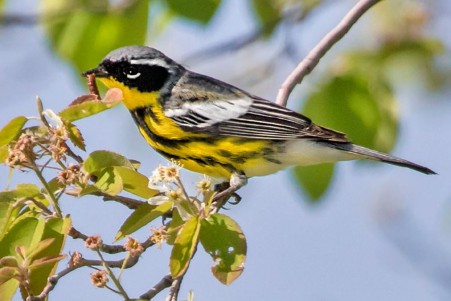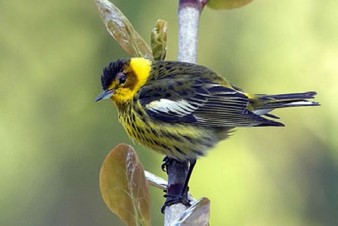Martha Steele

Magnolia Warblers have been found wintering in shade-grown coffee plantations. (All photographs by Sandy Selesky.)
On a recent and glorious late September day, I sat on our deck at our Vermont home, enjoying the solitude and the warmth of the morning sun on my face. I heard the ubiquitous Blue Jay and Black-capped Chickadee, but this is not a particularly exciting time for a blind birder. Most bird vocalizations in late summer and early autumn, if any, are of the challenging, chipping variety. Still, I revel in the vicarious pleasure of listening to Bob’s reports of what he saw during his regular morning walks around the property. Migration back south is in full swing during September, and we never know what will be in a mixed flock feeding near our house.
As I sat there, eyes closed and listening to the jays, chickadees, and an occasional chip of a Yellow-rumped Warbler, I was jolted from my seat with the nearby and beautiful full song of a White-throated Sparrow. I wanted to hear it again and again, but alas, it did not perform an encore before we departed on our own southward migration to Boston.
The sparrow may have been a migrant in the midst of its journey, or it may have been a resident that would stay the winter, sustained in part by winter feeders. Regardless, its announcement of its presence moved me deeply, as birds often do. Readers may now know that I often talk to birds, wishing them well here in their northern breeding grounds, during their amazing migrations, and in their southern wintering grounds. In this case, the sparrow seemed to be talking to me, signaling its farewell until next spring.
I casually reached for my coffee cup on the table in front of me and thought of its connection to the gift of song that I had just received from the sparrow. I thought of migrants from all over North America heading to their Latin American wintering grounds, where the coffee I was drinking was grown.
I love coffee and, to be honest, cannot do without it in the morning. My coffee habit is actually a problem when it comes to birding. Getting up early, grabbing a cup or two of coffee, and then heading out to bird where there are often no facilities is not always the ideal situation. Still, I persist in my habit, and I know that I am not alone. And in this case, my habit is helping to sustain and conserve needed habitat for the southbound migrants.
The coffee that Bob and I drink is one of a number of brands (in our case, Birds & Beans, a Boston-based company using New England roasters) that are certified as Smithsonian Migratory Bird Center (SMBC) Bird Friendly® shade-grown and organic coffee. When my birds return to their southern wintering grounds in Latin America, I know that at least some of them will find refuge in a bird-friendly coffee plantation characterized by a rich, complex, and diverse habitat in which the coffee plants grow. It gives me at least some measure of satisfaction that in a small way, I am helping to provide nourishing and supporting habitats for our birds in their winter homes.
Scott Weidensaul wrote an excellent and educational article for Bird Observer (Weidensaul 2009) in which he described how the SMBC Bird Friendly® program is the gold standard for shade-grown coffee and why the plantations that meet SMBC Bird Friendly® certification are so important to our wintering migratory birds. While Weidensaul and others have since noted that many coffees are marketed as eco- or bird- friendly, the SMBC Bird Friendly® certification stands out with its rigorous, science- based standards that growers must meet (e.g., canopy height, tree diversity, foliage cover, multiple vegetation strata). The result is that beans mature far more slowly under the shade trees that birds need than coffees grown in habitat-destroying sun plantations. The extended growing process imparts a deeper, richer flavor to the coffee.
According to Robert Rice, who oversees the SMBC Bird Friendly® coffee program, recent years have seen substantial growth in Bird Friendly® coffees. For example, the number of hectares supporting SMBC certified coffee grew from 4847 hectares in 2009 to 7343 hectares in 2015. Similarly, during the same time period, the volume of Bird Friendly® certified coffees increased from 6.1 million pounds to million pounds. Sales of SMBC Bird Friendly® coffees from Central and South America more than doubled from 2010 to 2014. In Nicaragua alone, more than 300 family farmers now grow Bird Friendly® beans, up from a single farm in 2011. And more is on the way, with Birds & Beans working with farmers and landowners in other regions of Nicaragua to convert thousands of hectares to Bird Friendly® coffee. In addition to the availability of SMBC Bird Friendly® coffee from online distributors, the coffee is showing up in more and more retail outlets (including major grocery retailers) throughout the country, driving up demand even more.
In 2009, few bird or conservation organizations talked about or may even have known about SMBC Bird Friendly® coffees. Today, SMBC Bird Friendly® coffees are endorsed by the Cornell Laboratory of Ornithology, the American Birding Association, and the American Bird Conservancy, as well as many local conservation organizations across the country. Japan’s Wild Bird Society and the Royal Society for the Protection of Birds in the United Kingdom also support protecting habitat by selling Bird Friendly® coffee at their shops.

Cape May Warblers have also been found wintering in shade-grown coffee plantations..
The growth of SMBC Bird Friendly® coffee sales across all available brands is very encouraging, but at the same time, there is plenty of room for exponential growth. Says Weidensaul: “The awareness of Bird Friendly® coffee and its importance for migratory birds has grown tremendously, and the impact on bird conservation in Latin America is profound. When I visit areas like the highlands of northern Nicaragua, where hundreds of small family-owned shade coffee farms are protecting quality bird habitat while producing millions of pounds of certified organic Bird Friendly® coffee (as well as generating a premium price that is encouraging farmers to restore grain fields and pastures to forest) the benefits are incredibly clear. We have made a lot of progress but we can do more to protect immeasurably greater areas of bird habitat” (Weidensaul, personal communication). The higher the demand for certified coffee, the more habitat is protected under the certification program.
Bob and I gravitated to SMBC Bird Friendly® coffee after two eloquent and convincing talks in late 2008 and early 2009 by Weidensaul and Kenn Kaufman, both speaking to the unequivocal benefits of SMBC Bird Friendly® coffees for birds and on behalf of the nascent Birds & Beans company. Many birders attended at least one of the talks. Although generally supportive of the coffee, a number of listeners expressed concern about the cost of ordering the coffee online (these coffees were not yet available in local retail stores), which meant shipping and handling costs would be added to the base cost of the coffee. To address these concerns, Bob and I decided to ask others to join us when we ordered online and thus share in the shipping and handling cost, which was reduced to cents per bag. This meant that the price of the coffee was comparable to premium coffees found in supermarkets or coffee specialty stores. Our Arlington-based coffee group was born, and we have not stopped since.
But no matter the worthiness of supporting SMBC Bird Friendly® coffee, no one would buy the coffee if it was not also good. The amazing loyalty of members of our coffee group to this coffee attests to the extraordinary flavor of SMBC Bird Friendly® coffee.
Since starting the Arlington coffee group in the spring of 2009, we have ordered over two tons of roasted Bird Friendly® coffee, or over 5000 pounds of green coffee beans. Although we cannot quantify how much bird-friendly habitat our group is helping to conserve, we know our business is helping bird conservation efforts.
If we drink coffee, we may as well buy coffee that helps the birds that we are so passionate about, never mind the family farmers working the plantations. Buying SMBC Bird Friendly® coffee is a very small step for each one of us, but a very big step for our migratory birds.
So, yes, I take pride in being part of the growing number of conservation-minded coffee drinkers in supporting the SMBC Bird Friendly® coffee of our choice. Visit the SMBC website for more information about their program and for listings of where you can purchase Bird Friendly® coffees online or near you.
In a world that often seems so overwhelmed with negativity, we can take solace in our own positive actions related to what matters the most to each of us. When you sip your morning mug of coffee, you too could take satisfaction in knowing that you are helping your birds, you too could help expand areas of quality habitat in coffee growing regions, and you too, as I do, can talk to your birds, telling them what you are doing for them and wishing them well. You would be joining a growing number of birders and conservationists doing the same, a collective series of small steps making a singular profound impact for migratory bird conservation.
Reference
- Weidensaul, S. 2009. A Steaming Mug of Conservation, Bird Observer 37 (1): 28-32.
Martha Steele, a former editor of Bird Observer, has been progressively losing vision due to retinitis pigmentosa and is legally blind. Thanks to a cochlear implant, she is now learning to identify birds from their songs and calls. Martha lives with her husband, Bob Stymeist, in Arlington. Martha can be reached at marthajs@verizon.net.